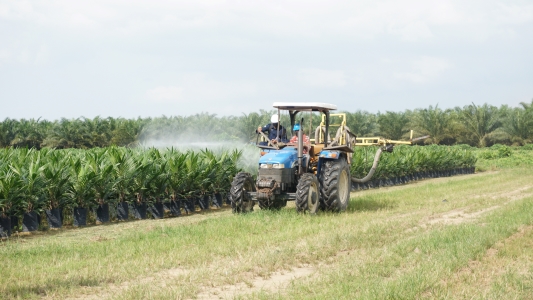Together with the SV IPB University Technology and Management of Plantation Production Study Program, You can Study with a Full Scholarship

The Applied Education Program in Technology and Management of Plantation Production (TMP) at the Vocational School of IPB University is an A-accredited Study Program (Prodi) that can guarantee competent graduates in the plantation industry. This study program was formed based on occupation, the curriculum is structured based on the Indonesian Qualifications Framework (KKNI) and supports the Freedom of Learning – Independence Campus (MBKM) program.
"The TMP Study Program has a vision to become an applied undergraduate program that is superior and competitive in Asia and produces professional graduates in the plantation sector," said Ade Astri Muliasari, MSi as Head of the TMP Study Program at the Vocational School of IPB University.
He revealed that the TMP study program is the only study program at IPB University that has collaborated with one of the large private palm oil companies, namely PT Minamas Plantation since 2010. Thanks to this collaboration, students have the opportunity to get a full service bond scholarship, starting from living expenses, school fee (SPP), graduation to guaranteed employment.
"The curriculum that is prepared also supports the MBKM program. Students are included for industrial internships with corporate partners as well as programs organized by ministries such as the Vocational Indonesian International Student Mobility Awards (IISMAVO) and Certified Independent Internships and Studies (MSIB)," he explained
In addition, students are also given professional development material, conflict management and plantation extension communications, so that graduates are expected to be able to think creatively and critically and be able to deal with problems in plantations.
According to Ade, the curriculum is one of the advantages of the TMP study program. The curriculum is formed according to the occupation and career path of graduates starting from the technical aspects of crop production, knowledge at the foreman assistant level to basic managerial material for managing plantation resources.
."Learning in the TMP study program is also designed in a dual system, students study in industry and on campus. Teachers and lecturers come from campuses and industry practitioners, so they can produce competent graduates," he continued.
Ade explained, the team of lecturers and instructors are also lecturers and industry practitioners who have competency certificates as oil palm plantation assistants from the Professional Certification Institute. The TMP study program teaching team also has many achievements, such as receiving a research grant to the Matching Fund program.
Learning facilities are also very complete, especially after receiving a 1.3 billion grant from the Vocational College Strengthening Program (P3TV) in 2020 to complete learning infrastructure.
Until now, the TMP study program has enthusiasts with a ratio of 1:4 to 1:6 every year. The current number of students is 220 people.
In addition to getting multi-commodity learning, students also have the opportunity to take part in international cooperation programs such as student exchanges. For example, student exchanges joining the Southeast Asia Technical and Vocational Education (Seatvet). The TMP Study Program has also collaborated with Nagoya University, Kasetsart University and several other foreign universities.
"We also have an assistant scheme for oil palm plantations so that graduates get a competency certificate (sertikom) that is recognized by the National Professional Certification Agency (BNSO). This year TMP has a Sertikom scholarship quota for 20 students," he explained.
The job prospects for graduates are as divisional assistants or departmental assistants up to the managerial level. Graduates can also have careers as research assistants, plantation extension workers and plantation entrepreneurs. Most of the TMP Study Program graduates are absorbed in the palm oil and sugar cane industries.
"Don't think that agriculture is conventional, even though modern technology has begun to develop and be facilitated in this study program. As long as people still need a lot of products from plantation commodities such as cooking oil and sugar, the world of plantations will always exist, jobs will always be available,” he continued.
"Indonesia is a major producer of palm oil, so employment opportunities are wide open, scholarships are also wide open, for example scholarships from the Oil Palm Plantation Fund Management Agency (BPDPKS). Currently the TMP study program has received a full scholarship quota from BPDPKS for 30-60 prospective students who come from planters or families of planters," he said. (MW/Rz) (IAAS/RZL)



